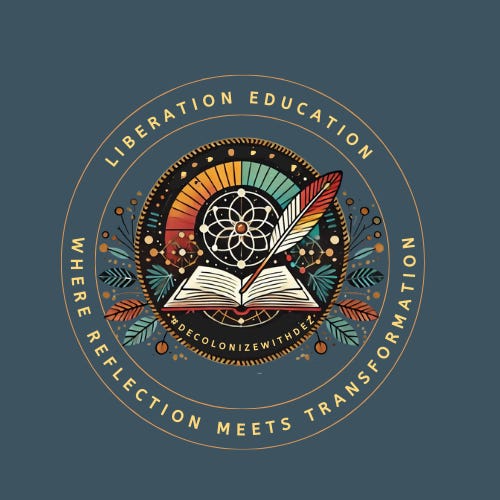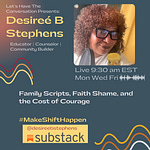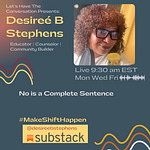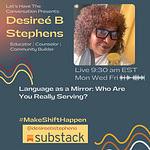Mutual Aid Is Liberation: Moving Beyond Charity to Collective Power
If we refuse to rely on capitalism, what will we build instead?
We’ve been talking a lot about mutual aid in the 100 Days of Community series—what it is, how it works, and why it’s necessary. But today, I want to take it a step further.
Because mutual aid is not charity.
It is not about handing down scraps from the table. It is not about feeling good for helping someone in need.
Mutual aid is a commitment to collective survival.
It’s about recognizing that capitalism demands someone be at the bottom—and that if we do nothing, that someone could be us.
Mutual aid is the future, but it only works if we build it now.
Charity vs. Mutual Aid: The Crucial Distinction
Too often, people view mutual aid through the charity mindset—an ingrained belief from supremacy culture that says giving should be based on pity, guilt, or moral superiority.
That mindset shows up when people say things like:
"I give to Des just like I give to Goodwill."
"I donate when I can, but I can’t afford to help everyone."
"I wish I could give more, but I have to focus on my own survival."
Here’s what that misses:
Mutual aid isn’t about giving to an individual—it’s about sustaining a system that benefits all of us.
You’re not "helping" me—you’re investing in the work that helps entire communities.
Mutual aid isn’t a favor—it’s a fundamental part of how we survive outside of capitalism.
When you support my work—whether through a Substack subscription, ko-fi payment, or direct contribution to the Barn Raising mutual aid fund—it’s not about me.
It’s about ensuring that people who need rental assistance, food, transportation, legal aid, or resources can get them without having to beg a system designed to keep them poor.
And it’s about ensuring that this work continues, not just for one crisis but for generations.
Why Mutual Aid Must Be Structured Like a Bill
Right now, most people treat mutual aid as an occasional act of generosity instead of a sustained practice of redistribution.
That has to change.
We need to treat mutual aid like we treat rent, groceries, or utilities—a necessary expense for a functioning society.
Imagine if, instead of seeing mutual aid as an extra burden, you saw it as a monthly commitment to liberation—as essential as paying your internet bill or buying food.
What if you committed to $20, $50,$100, $500, or even $1000 a month—not as a donation, but as an investment in collective survival?
That money doesn’t just disappear—it feeds families, keeps people housed, funds businesses that serve the people, and allows us to break free from systems that were never built to support us.
How Capitalism Keeps Us in the Charity Mindset
Capitalism demands a permanent underclass.
It cannot function unless some people are always struggling.
That’s why corporations and governments love charity—because it doesn’t challenge the systems that create poverty.
Charity keeps power in the hands of the giver—it forces people to prove they’re "deserving" of help, making them dependent on institutions that only offer just enough to keep them alive.
Mutual aid eliminates that dependency.
Instead of waiting for a billionaire’s tax write-off, we build our own safety nets.
Instead of hoping the government finally cares, we take care of each other right now.
Instead of supporting businesses that extract from us, we fund the ones that sustain us.
If capitalism was designed to fail us, then why are we still waiting for it to save us?
Three Key Takeaways
Mutual aid is not charity—it is a commitment to collective survival. Instead of relying on systems that were never built for us, we must sustain our own.
Treat mutual aid like a bill, not a donation. Making a sustained financial commitment, no matter how small, ensures that community support remains available for those who need it most.
Capitalism depends on the charity mindset to maintain inequality. Mutual aid disrupts this by shifting power away from institutions and back into the hands of the people.
This Is the Moment to Step Up
I’ve made today’s post free because I want you to see this work in action.
But here’s the reality:
Most of this content is paywalled because this work is labor; it is my actual job, not a hobby, and I am also navigating capitalism.
This isn’t just writing—it’s community building, resource redistribution, and system creation.
Without sustained support, the work as I offer it can not continue.
I don’t do this work alone. I do it with you, you are my co-creator.
So if you believe in mutual aid—if you want to build a liberated future where community takes care of its own—this is your invitation.
Become a paid subscriber for $8/month.
Commit to a mutual aid fund that aligns with your values.
Invest in the work that builds a future where we don’t have to rely on capitalism to survive.
No money? No problem. Email me at scholarships@desireebstephens.com, and I’ll comp your subscription.
But if you do have the means, I’m asking you to commit today.
Because mutual aid isn’t just a theory. It’s the future.
Let’s build it. Together.
Preview for Tomorrow’s Topic: Mutual Aid Models for the Future
Today, we talked about the why of mutual aid. Tomorrow, we’ll focus on the how.
We’ll explore different mutual aid models that offer long-term sustainability and practical alternatives to capitalism, including:
Community-Based Infrastructure: Health, Food, and Education for Collective Survival
Cooperative Housing & Co-Living: Shared Responsibility for Stability
Worker-Owned Businesses & Community-Owned Resources: Ending Exploitation
Mutual aid isn’t just a survival tool—it’s a blueprint for a post-capitalist future.
Conclusion
Mutual aid is not just a lifeline in times of crisis—it is a blueprint for the world we are building. It is how we reclaim power from institutions designed to keep us in struggle and redistribute it back into our own hands. It is the refusal to accept that survival should be conditional, that basic needs should be locked behind paywalls, or that we must beg for dignity.
For too long, we have been taught that care is something we must earn, that help is something to be given sparingly, and that those in need should feel grateful for scraps. Mutual aid shatters that illusion. It is a radical act of choosing each other over profit, over hierarchy, over the lie that capitalism will ever serve us.
The reality is, this work is not free. It takes time, labor, and resources to organize, educate, and sustain the movement. I am calling on you not just to witness this work, but to invest in it. Because this is not about charity. This is about commitment.
If we refuse to rely on capitalism, what will we build instead?
We are already building it. The only question is—will you be part of it?
Let’s continue the work. Let’s sustain it. Let’s commit.
In solidarity and liberation,
Desireé B. Stephens CPS-P
Educator | Counselor | Community Builder
Founder, Make Shi(f)t Happen
Join me tomorrow at 9:30 am for my next live video in the app














Share this post